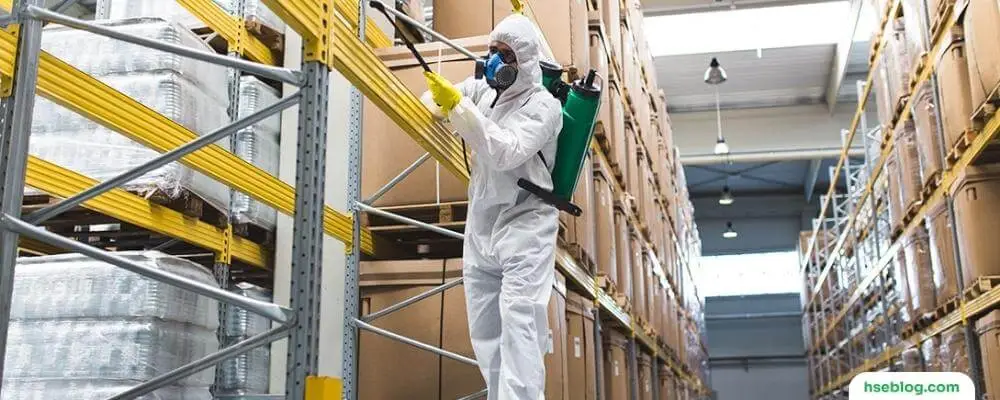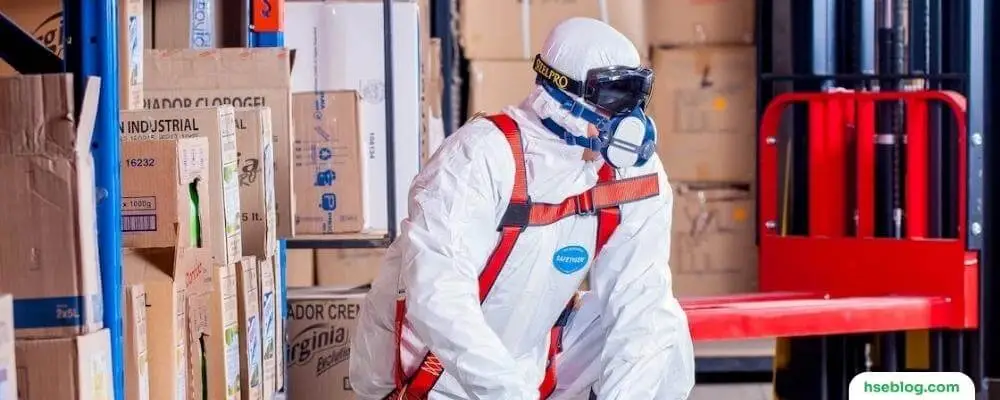In the ever-evolving landscape of the modern workplace, the health and safety of employees have never been more paramount. Workplace hazards lurk in many forms, whether it’s a bustling manufacturing plant, a state-of-the-art laboratory, or a sprawling construction site. Enter the unsung heroes of occupational safety – Industrial Hygienists. But who are these professionals, and what magic do they weave to keep the wheels of industry turning safely?
This enlightening blog post will delve into the captivating world of Industrial Hygiene. We’ll uncover the roles, responsibilities, and skills of these essential workplace health and safety guardians. So, fasten your seatbelts as we navigate through the science and art behind protecting the workforce from the myriad of environmental and physical hazards that shadow our daily grind. Whether you’re an employer, an aspiring Industrial Hygienist, or just curious about how the gears of occupational safety mesh, this read will enrich your understanding.
What is an Industrial Hygienist?
An Industrial Hygienist is a professional who focuses on ensuring the safety and health of workers by identifying, evaluating, and controlling hazards in the workplace. These hazards can include chemicals, noise, radiation, and ergonomics. The Industrial Hygienist’s primary goal is to prevent workplace-related illnesses and injuries by recommending strategies and solutions to minimize exposure to harmful elements and conditions.

Under the Act, OSHA develops and sets mandatory occupational safety and health requirements applicable to the more than 6 million workplaces in the U.S. OSHA relies on, among many others, industrial hygienists, or “IHs,” to evaluate jobs for potential health hazards. More than 40% of OSHA’s compliance officers are IHs.
Developing and setting mandatory occupational safety and health standards involves determining the extent of employee exposure to hazards and deciding what is needed to control these hazards, thereby protecting the workers.
Industrial hygienists are trained to anticipate, recognize, evaluate, and recommend controls for environmental and physical hazards that can affect the health and well-being of workers.
Important IH responsibilities include:
- Identifying, measuring, and analyzing workplace health hazards and exposures (chemical, physical, biological, ergonomic) that can cause sickness, impaired health, or significant discomfort.
- Recommending hazard control strategies to eliminate/reduce hazards and employee exposure to hazards.
The American Industrial Hygiene Association (AIHA) is the primary organization concerned with industrial hygiene. AIHA is a nonprofit organization devoted to achieving and maintaining the highest professional standards for its members. Over half of the 10,000 members are certified industrial hygienists (CIHs); many hold other professional designations. AIHA administers comprehensive education programs that keep occupational and environmental health and safety (OEHS) professionals current in industrial hygiene. For more information, open the AIHA Fact Sheet.

Roles and Responsibilities Of Industrial Hygienists
The roles and responsibilities of an Industrial Hygienist encompass a range of activities to protect workers’ health and safety in various environments. Here are the key roles and responsibilities:
- Hazard Identification: They identify potential health hazards in the workplace, such as chemical, biological, physical, and ergonomic risks.
- Hazard Assessment and Measurement: Industrial Hygienists use specialized equipment and methods to measure and evaluate the levels of exposure to hazards.
- Risk Analysis: They assess the risks associated with the identified hazards and determine the likelihood of adverse health effects.
- Recommend Control Measures: They recommend appropriate control measures to eliminate or reduce exposure to hazards. This can include engineering controls like improving ventilation and administrative controls like changing work practices and recommending personal protective equipment.
- Implementing Safety Programs: They may develop and implement occupational health and safety programs to ensure compliance with regulations and best practices.
- Training and Education: They educate employees and management on the importance of health and safety, provide training on safety procedures, and inform them of potential workplace hazards.
- Regulatory Compliance: They ensure the organization complies with government health and safety regulations. This includes keeping up with changing regulations and ensuring the workplace meets them.
- Record Keeping and Documentation: They maintain records of exposure measurements, hazard assessments, and safety training sessions for compliance and reporting purposes.
- Emergency Response Planning: They assist in developing plans for dealing with emergencies such as chemical spills, ensuring proper procedures are in place to handle such events.
- Research and Development: They stay informed about the latest scientific developments in occupational health and might conduct research to find new methods for controlling workplace hazards.
- Communication: They communicate with management and employees regarding health and safety issues and work with other professionals, such as engineers and toxicologists, to address complex problems.
- Health and Safety Advocacy: They advocate for improving workplace conditions and employee health and safety through participation in professional organizations and other forums.
In essence, an Industrial Hygienist plays a critical role in preventing work-related illnesses and injuries by assessing and controlling environmental and occupational hazards, educating workers, ensuring compliance with regulations, and promoting a safety culture within the organization.

Skills To Become An Industrial Hygienist
To become an industrial hygienist, you’ll need a combination of education, skills, and experience. Industrial hygiene identifies and controls workplace hazards to protect workers’ health and safety. Here are the key skills and qualifications you should consider:
- Communication Skills: As an industrial hygienist, you need to effectively convey complex information regarding health hazards to a diverse audience, which may include workers, managers, or regulatory authorities. This encompasses writing clear reports and creating materials that educate employees on safety practices.
- Organization Skills: Managing multiple tasks such as assessments, data collection, and record-keeping requires strong organizational skills. Keeping data and documentation in order is critical for efficiency and regulation compliance.
- Critical Thinking Skills: The ability to objectively analyze and evaluate information, including scientific data and regulations, is essential. This aids in making well-informed decisions regarding hazard identification, risk assessment, and control strategies.
- Interpersonal Skills: Building relationships with employees, management, and external stakeholders is crucial. This helps in creating a collaborative environment for implementing health and safety programs.
- Active Listening Skills: Paying close attention to what others are saying and understanding the points made is vital. It helps gather insights from employees’ experiences and concerns regarding workplace conditions.
- Detail-oriented: Being detail-oriented involves paying close attention to specifics. This is important in accurately identifying hazards, analyzing data, and ensuring compliance with safety regulations.
- Able to Work Independently: Industrial hygienists must be capable of working with minimal supervision, particularly when conducting field assessments or research. They need to be self-driven and resourceful.
- Time Management Skills: Managing deadlines and efficiently allocating time to various tasks such as assessments, training, and reporting is necessary to ensure timely completion of responsibilities.
- Research Skills: An industrial hygienist must be adept at conducting scientific research and staying updated on emerging health and safety issues, methodologies, and technologies.
- Testing Skills: Proficiency in using various testing equipment and methodologies to measure exposures to hazards such as chemicals, noise, and radiation is essential.
- An Ethical Approach to Work: This involves a commitment to integrity and ethical standards, particularly in ensuring the health and safety of workers and complying with regulations.
- Presentation Skills: The ability to present information clearly and engagingly in safety training sessions or when reporting findings to management is important.
- Data Analysis Skills: Analyzing data collected during assessments is crucial for understanding exposure levels and risks. This involves using statistical tools and interpreting the results to make informed decisions.
- Investigative Skills: This involves conducting thorough investigations of incidents or conditions, gathering evidence, and analyzing information to identify root causes and develop corrective actions.
- Problem-solving Skills: The capacity to identify problems and develop effective solutions, especially in reducing or eliminating health hazards, is key. This may involve creativity in adapting control measures to specific workplace environments.
In summary, becoming an industrial hygienist requires a diverse skill set that includes a strong understanding of science and proficiency in communication, data analysis, problem-solving, and an ethical approach to ensuring the health and safety of workers.

Where Do Industrial Hygienists Find Work?
Industrial hygienists are in demand across various sectors due to their expertise in identifying and controlling workplace hazards. Here is a more detailed explanation of the places where industrial hygienists typically find work:
- Colleges and Universities: Academic institutions often employ industrial hygienists to ensure the safety of laboratories, workshops, and other facilities. They also play an essential role in teaching and training future industrial hygienists and other occupational safety professionals.
- Consulting Firms: Consulting firms specializing in environmental health and safety hire industrial hygienists to provide expert advice and services to different companies. They might work on contracts to conduct workplace assessments, develop safety programs, and offer training for clients in various industries.
- Federal, State, County, and Municipal Governments: Government bodies employ industrial hygienists to ensure public sector workplaces comply with safety regulations. They might also develop, implement, and enforce occupational health and safety laws and regulations.
- Hospitals and Medical Centers: In healthcare settings, industrial hygienists focus on infection control, handling and disposal of biomedical waste, and ensuring the safety of healthcare workers exposed to various biological or chemical hazards.
- Industrial Settings such as Oil and Gas, Manufacturing, Agriculture, Transport, and Logistics: Industrial hygienists in these sectors focus on reducing exposure to physical, chemical, and biological hazards. For example, in manufacturing, they may work to minimize exposure to toxic substances, while in agriculture, they might focus on pesticide exposure and safety.
- Insurance Companies: Industrial hygienists working for insurance companies might be involved in risk assessments of workplaces to determine insurance premiums and policies. They might also work on loss control, helping companies reduce injuries and illnesses that could lead to insurance claims.
- Laboratories: In laboratories, industrial hygienists ensure the safe handling of chemicals, biological agents, and other hazardous materials. They implement controls and practices to protect researchers and technicians from exposure.
- Public Utility Companies: These companies often deal with hazards such as high-voltage electricity, chemicals used in water treatment, and natural gas. Industrial hygienists work to protect utility workers from these hazards and ensure the safe operation of facilities.
- Research Institutions: At research institutions, industrial hygienists might engage in cutting-edge research to develop new methods for hazard control, study the effects of exposures to various agents, and contribute to scientific knowledge in the field of occupational health.
Industrial hygienists can find employment in various settings where health hazards might be present. They play a vital role in protecting workers and the public from potential health risks associated with various occupational and environmental exposures.
Conclusion
In conclusion, an Industrial Hygienist is a specialized professional dedicated to safeguarding the health and well-being of employees in various work environments. Through a combination of science and practical application, they anticipate, identify, evaluate, and control workplace hazards ranging from chemical exposures to ergonomic issues. With a diverse skill set encompassing critical thinking, data analysis, communication, and problem-solving, Industrial Hygienists are indispensable in fostering a safety culture, ensuring regulatory compliance, and protecting the workforce and the surrounding community from potential health risks.

